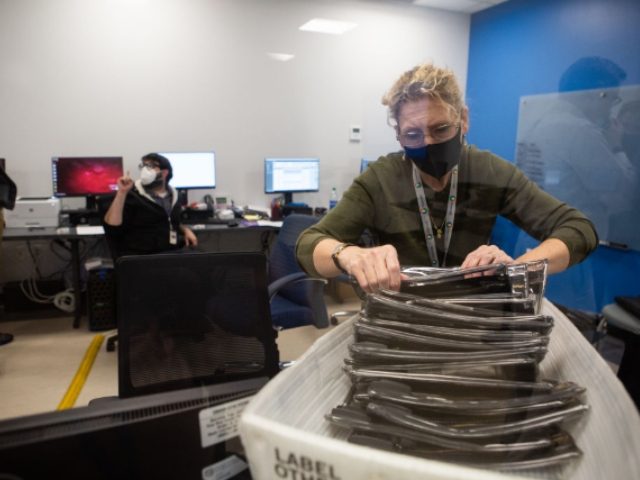Update: Reid Magney, public information officer for the Wisconsin Election Commission, says clerks did not alter ballots, but rather filled in witness addresses on ballot certification where not completed. The “Certification of Witness” on absentee ballot envelopes requires the voter’s signature, a witness signature and witness address, without which the ballot, by law, cannot be counted. However, the law does not specify who affixes the witness address. Wisconsin Election Commission guidance in effect since October 2016, and agreed to by Republican and Democrat Commission members, is that a clerk can use “reliable information (personal knowledge, voter registration information, through a phone call with the voter or witness)” to resolve missing witness address information. What is not known at this time is how and whether this guidance was followed on the thousands of certifications in question.
Poll workers in Wisconsin may have unlawfully altered thousands of mail-in ballots due to unlawful guidance from the state’s election commission, according to a report.
According to Wisconsin law, an absentee ballot requires that it be signed by a witness who also lists his or her address. Should the ballot not contain the a witness address, the ballot is disallowed and must be returned to the voter so that the witness can provide that information.
However, according to a report from the “Dan O’Donnell Show,” sources claim that “clerks and vote counters” in the state wrote in the witness signatures themselves. Furthermore, the report claims that the election workers chose to write in the addresses because they were illegally advised to do so by the Wisconsin Elections Commission (WEC).
If the poll workers did in fact write the addresses in, the ballots are invalid.
“The statute is very, very clear,” said retired Wisconsin Supreme Court Justice Michael Gableman. “If an absentee ballot does not have a witness address on it, it’s not valid. That ballot is not valid.”
According to O’Donnell, “The WEC sent uniform instructions to voters with their mail-in ballots that informed them that ‘your witness must sign and provide their full address (street number, street name, city) in the Certification of Witness section’ and warned that ‘if any of the required information above is missing, your ballot will not be counted.'”
Though, according to O’Donnell, additional guidance was sent to clerks in October that instructed them to fill-in the witness address portion of the ballot themselves, to prevent it from being invalidated.
“Please note that the clerk should attempt to resolve any missing witness address information prior to Election Day if possible, and this can be done through reliable information (personal knowledge, voter registration information, through a phone call with the voter or witness),” the WEC wrote. “The witness does not need to appear to add a missing address.”
Judge Gableman says that directive “turned the statute on its head.”
“In defiance of and direct contradiction to the statute, the Wisconsin Elections Commission gave guidance–that is, cover–to all 72 county clerks and turned the statute on his head,” Gableman explained. “They said, ‘Gee, we know the law says an absentee ballot without the witness address is not valid, but county clerk, you have a duty to go ahead and look up on your own the witness’ address if there’s no address on the absentee ballot.”
The WEC appears to be aware of the questionable legality of their directive given that the commission told clerks to write the addresses in using red ink, which would make the ballots easier to locate during a recount.
O’Donnell writes:
The Republican Party of Wisconsin estimates that thousands of witness addresses may have been changed, thus invalidating the ballots on which they appeared. The statutory remedy for this is to subtract a commensurate number of votes for the candidates for whom those ballots were cast, meaning that vote totals may substantially change.
President Trump’s campaign is investigating the scale to which clerks and election workers were altering ballots as well as several other incidents that it has termed ‘irregularities.’ President Trump has also publicly called for a recount of Wisconsin’s vote.
As it stands, Joe Biden won the state by roughly 20,000 votes. In addition to investigating potentially invalid ballots in Wisconsin, the Trump legal team is also looking at potential irregularities and allegations of fraud in several other states.

COMMENTS
Please let us know if you're having issues with commenting.